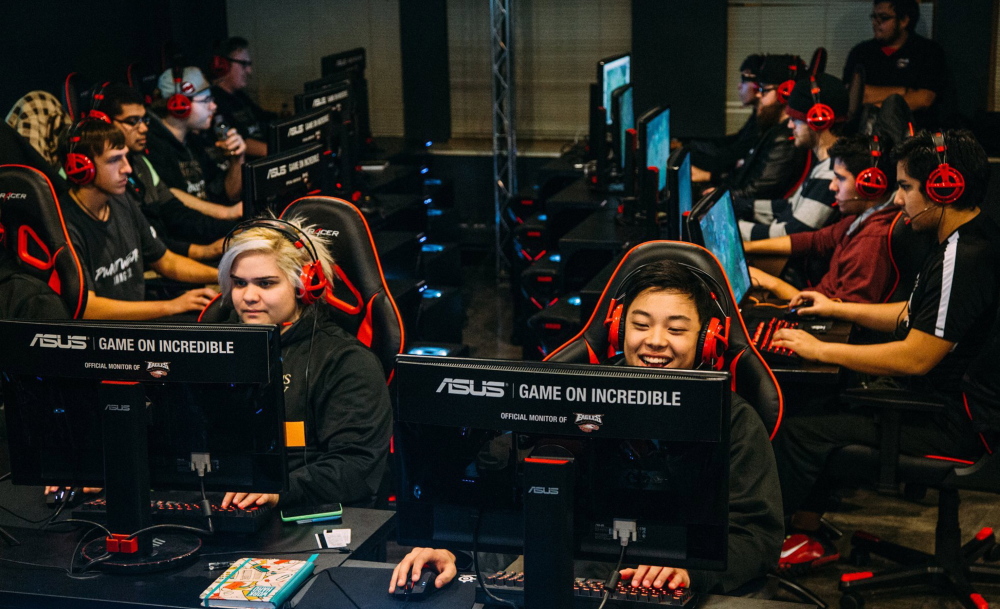CHICAGO — It was a shoulder injury during his junior year of high school that ended Derek Micheau’s dreams of being a pitcher. Later that season, a knee injury ended his hopes of playing catcher.
Turns out he didn’t need healthy shoulders or knees for a college athletic scholarship.
Micheau earned a scholarship to play video games at Robert Morris University Illinois. The small school in Chicago became the first U.S. university to offer scholarships for video gaming when it launched its eSports program this fall. The school gave out 35 scholarships to gamers from around the country.
“My mom thought it was a scam,” said Michaeu, a 20-year-old freshman from Olympia, Wash.
Turns out, some parents might want to think twice before telling their kids to turn off the computer. Micheau’s scholarship pays for half of his tuition, room and board, which at full price runs more than $30,000.
The teams are a part of the athletics department at Robert Morris, which has about 2,500 students at its Chicago campus and about 6,000 across several campuses in Illinois. The school spent $100,000 turning a computer lab into an eSports Arena with fast-processing computers, large monitors, high-end ergonomic gaming chairs and a strict no-food-or-drink policy.
The gamers play “League of Legends,” a multiplayer online battle arena, or MOBA, that groups players into teams in head-to-head battles. The game requires each player to take on certain roles with certain skills. The goal is to knock down an opponent’s tower before the opponent knocks down theirs.
The two teams on Robert Morris’ varsity squad are undefeated this year, playing against college club teams in leagues.
The eSport athletes, as the school calls them, took part in the university’s homecoming rally. They are outfitted with team-branded hoodies and jackets, like most other scholarship athletes. The co-ed team has five coaches – one head coach and four assistants.
‘TAKING IT SERIOUSLY’
“We’re definitely taking it seriously. We want them to do well,” said Kurt Melcher, associate athletic director and program coordinator.
It was his idea to launch the program to attract a diverse assortment of students to the school. The national attention – the program has been featured by ESPN, NPR, HBO’s “Real Sports” and a variety of other outlets – has been a “nice byproduct,” Melcher said.
The team is not a revenue generator for Robert Morris University Illinois, but most college sports teams aren’t, except for high-profile football and men’s basketball teams. The school has partnered with a few companies who sponsor the team.
“I wanted to make sure we jumped on it as fast as possible because I knew this would be a big deal. There was no way it couldn’t be,” said John Spiher, marketing director at DXRacer USA, which sells gaming chairs and sponsors the team. The company outfitted Robert Morris’ eSports arena with one of its chair models, which retails for $349.
The scholarship program is just the next step in a burgeoning industry. The best professional gamers earn six figures through sponsorship deals and competition winnings. There was more than $25 million available in prize money in 2013, a 350 percent increase since the start of the decade, according to Jim Yang, global chief strategy officer at Nurun, a global design and technology consultancy headquartered in Montreal.
The gaming industry as a whole generates $25 billion in annual revenue, according to the Entertainment Software Association, a Washington-based trade group.
The “League of Legends” finals in 2013 sold out the Staples Center in Los Angeles. The 2014 finals, held last month, drew more than 40,000 fans to a former World Cup soccer stadium in Seoul. Millions more watched online.
Because of the popularity, it might not be long before other schools try to join Robert Morris.
Spiher, who also is a student at Eastern Michigan University and president of LOL(at)EMU, the school’s “League of Legends” club, said gamers are the kind of students that are attractive to a university.
“They’re problem solvers,” Spiher said. “That’s what a game is. You have a certain goal, and you come across a lot of problems in the way of that goal. It’s the same way in college.”
BUT IS IT A SPORT?
Whether it’s a sport remains up for debate.
ESPN President John Skipper said during a conference earlier this year that his network is mostly interested in “real sports” and that he didn’t believe video games fell into that category.
“It’s not a sport,” he said. “It’s a competition, right? I mean, chess is a competition, and checkers is a competition.”
The network does, however, televise poker tournaments, noted Nancy Donohoe, director of public relations at Robert Morris.
“It’s kind of cool to see kids who might’ve been in the shadows say ‘I got an athletic scholarship, too,'” she said.
Kevin Kuan, president of Club eSports at Carnegie Mellon University, said the recent gains have helped erase some of the stigma associated with gaming.
“I think it’s pretty cool people are starting to be more open minded, not seeing video games as nerds in a basement,” he said.
Copy the Story LinkSend questions/comments to the editors.



Success. Please wait for the page to reload. If the page does not reload within 5 seconds, please refresh the page.
Enter your email and password to access comments.
Hi, to comment on stories you must . This profile is in addition to your subscription and website login.
Already have a commenting profile? .
Invalid username/password.
Please check your email to confirm and complete your registration.
Only subscribers are eligible to post comments. Please subscribe or login first for digital access. Here’s why.
Use the form below to reset your password. When you've submitted your account email, we will send an email with a reset code.